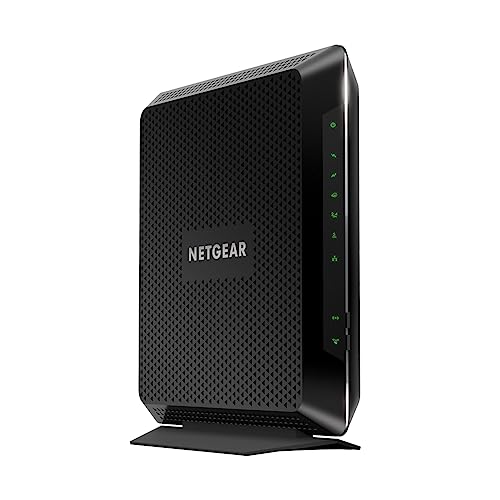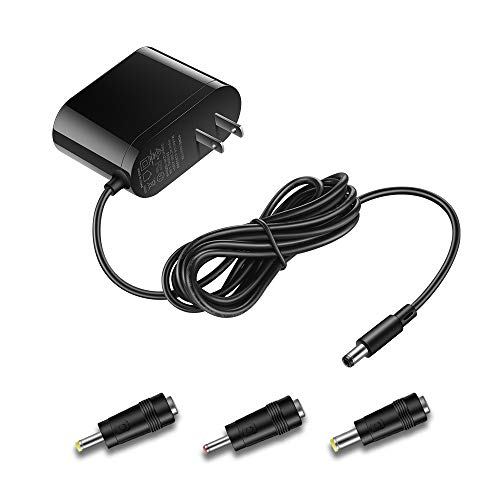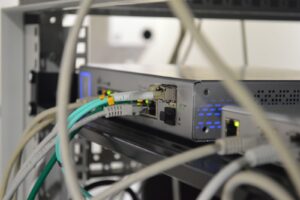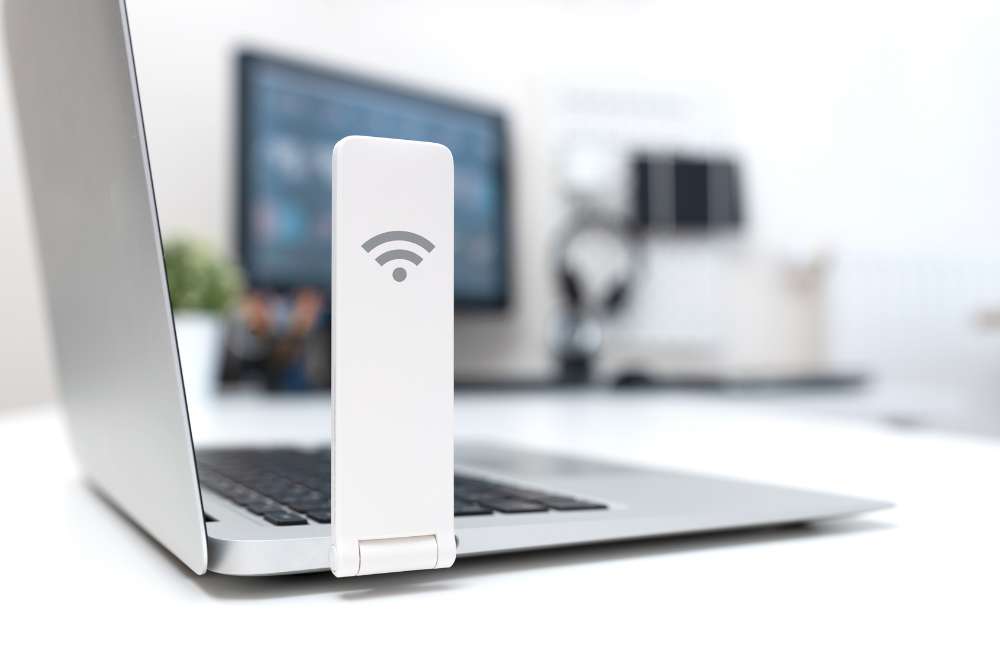Since we are becoming increasingly reliant on the Internet, having an Internet connection in every room of the house is essential. The only issue is that if the detached garage is too far away, the Wi-Fi range will not reach that part of your house.
This article on how to extend Wi-Fi to a detached garage will walk you through everything you need to know to increase your Wi-Fi range as quickly as possible.

Why do I Need Wi-Fi in My Garage?
There are numerous other benefits of installing a Wi-Fi network in your detached garage.
- Compatible with major cable internet providers including Xfinity, Spectrum, Cox and more. NOT compatible...
- [Compatibility] 12V Power Supply Adapter Compatible with Netgear, Linksys, Asus,Motorola, Motorola/Arris...
- With a strong Wi-Fi connection, you can use your smartphone to check football scores, read the news, or watch an educational YouTube video while working in your garage.
- There are numerous home automation and garage devices on the market now that you should think about for your garage. The most common is the garage door opener, which can be controlled from your phone’s application by connecting to your Wi-Fi. The smart garage door is safer, quieter, and more energy-efficient than traditional garage doors.
- The garage is also a common entry point for burglars, and they break into the garage using various methods. Garages are used to keep a wide range of items, which robbers are very aware of. One can easily lock or unlock the doors electronically and receive updates when it opens and closes on their cellphone.
- You can alter and enhance the condition of your garage in addition to doors. A security camera can be used to keep an eye on your detached garage. You will get updates and even monitor your garage from your smartphone. You may also liven up your desk with smart lights. These factors help you to get the most out of your Wi-Fi connection.


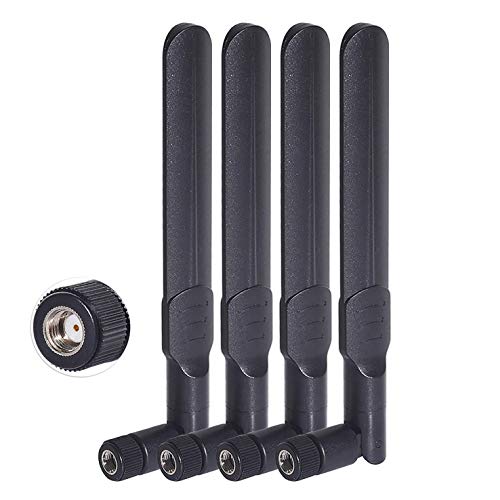
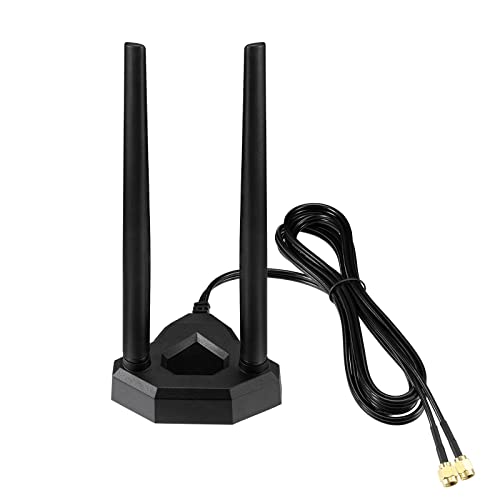






Now that you know why it’s important for you to have Wi-Fi in your detached garage, let’s move on to the main topic – how to extend Wi-Fi to a detached garage.
Ways to Extend Wi-Fi to A Detached Garage
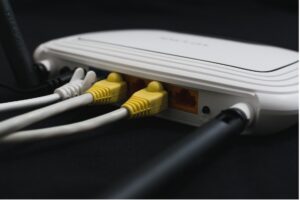
Below are some simple ways to extend your Wi-Fi to your detached garage.
Reposition Your Router
It’s good to move your Wi-Fi connection somewhere else in your house if it’s not evenly spread across your property.
To give more consistent Wi-Fi signal coverage, a centralized position in your house is clearly the best option. If you live in a two-story flat, this means relocating your router from the bottom floor to the top floor as strategically as possible.
You should carefully position the router so that it covers both your home and garage. If you have a detached garage, the most visible placement for your main router is outside the house’s wall.
Get A Strong Mesh Wi-Fi Router
Another approach to boost Wi-Fi coverage in your home is to set up a mesh network.
It functions similarly to a Wi-Fi extender in that it receives your router’s Wi-Fi signal and sends it to carefully arranged hardware devices to enhance your signal’s range.
A regular router with an extender would not be able to extend the coverage if you have a large residence. In such instances, a mesh network system is strongly advised.
They offer speedier network connections. Mesh networks are also significantly more dependable in terms of providing a steady Wi-Fi connection when you’re traveling around your house with mobile devices.
Update Your Hardware
If you think your router is in a suitable location, but it still doesn’t offer adequate signal, you should consider updating your router hardware. Updating your router might be as easy as upgrading your present router or replacing it with a better one.
Experts recommend changing your router and modems every three to five years. Whether your networking equipment is outdated or not, ask your Internet provider if they have any updated networking devices.
Check the device’s quality and power level while replacing an old router/modem with a new one. Routers with a large number of external antennas can deliver enough signals and amplify them to a great distance.
You can also examine the Wi-Fi configuration and modify the settings in addition to replacing the router hardware. For example, you can adjust the router’s signal frequency range and make it mandatory to extend Wi-Fi to your detached garage.
Switch The Frequency from 2.4 GHz to 5 GHz
Wireless frequencies ranging from 2.4 GHz to 5 GHz are available on modern routers. If a particular frequency isn’t working for you, try moving to a different one to see if the signal quality improves.
If your present router operates at 2.4 GHz and provides a weak Wi-Fi signal, you should switch to a 5 GHz router to get a better one.
Remove Any Channels That Aren’t in Use
The Wi-Fi signal can be harmed if an improper signal channel is used. Unfortunately, the rapid expansion of the frequency spectrum, which, if saturated, might degrade the connection, is a common problem in major cities.
To prevent this, after entering the router’s setup, select an unused channel or, if it’s not available, get the least saturated one. Then, take a look at the networks you’ve got. It assists you in changing the channel from the above setting options.
Invest in An Amplifier or Extender
When it comes to strengthening the signal in the garage, installing an extender or amplifier is one of the most successful alternatives. The most basic ones detect the Wi-Fi signal, copy the most critical parameters and security standards, and generate a new signal.
PLC adapters use the electrical network, and an Ethernet cable will be required to connect one of them to the router. They are more expensive, but they do not rely on the main router’s Wi-Fi network.
Another alternative is to buy a second router (or use an old one) and link it to the network with a cable. To use it as a repeater network Wi-Fi router, you’ll need to make certain changes.
Get A USB Antenna
If your detached garage is close to your home, a strong USB antenna is a less expensive option. Installing this on your computer and positioning it near the border of your house, close to your garage, will help you increase the range of your Internet connection.
A quality antenna will pick up on a lesser signal, and if your home’s router is on the same side as your garage, you might be able to get a solid connection. Of course, a USB antenna alone won’t provide you with a full-speed connection, but it might be enough to give you a good, dependable connection.
This solution is attractive because you won’t have to replace your current router or spend a lot of money on new equipment. You only need one USB antenna, but this method won’t work if your garage’s Wi-Fi signal is too weak.
Find a high-quality USB antenna that can provide a strong signal while also having a long range. You can also point the antenna in a specific direction to improve your Internet connection’s strength.
Finally, when choosing a USB antenna, look for one that is detachable and AC compatible. It should have a good speed and an extensive range, so it can be used to extend Wi-Fi to a detached garage.
A removable antenna can also be quickly changed with a more powerful one.










Get A Powerline Network Adapter
The next option is to use a Powerline Network Adapter. You can transfer the Internet over your house’s power cables to your garage. These adapters broadcast your Internet signal via your home’s electrical circuit, and they’re simple to set up.
A powerline adapter is a pair of devices that includes a transmitter and a receiver. An Ethernet cable or a wireless connection connects the transmitter to your home’s router, making it possible for the transmitter to access the Internet. It is then plugged into the nearest outlet to connect to your home’s electrical connections.
Next, the set’s receiver is attached to an outlet near the part of your house where you want to extend the Internet. Once connected, you can pair the transmitter and receiver, and the two devices will deliver your Internet connection across your home’s power lines.
Use An Ethernet Cable
Investing in a mesh network to give a good Internet connection to your detached garage isn’t always the most cost-effective option. If you merely need to bring the garage into wireless range, an Ethernet connection will suffice.
Keep in mind that you can only expand the connection for around 328 feet (100 meters) with this technique. You can establish a solid connection that won’t drop out in your garage if your line is less than 300 feet long.
Connect your Ethernet line to a port on your router indoors to accomplish this. The cable should now be routed outdoors, and through the conduit you buried underground.
Connect the other end of the cable to a network bridge for wired connections or a wireless access point for a wireless network by routing it through the garage wall. It’s really dependable, albeit it takes a long time to set up, and you’ll notice a lot of exposed cables in various locations.
This installation, however, will take some time to complete. However, given the cost, it would be worth it.
FAQs
Here are a few other common questions people ask.
How to Increase the Range of Your Wi-Fi Without Losing Speed?
When you use Wi-Fi extenders, your Internet speed decreases. So, how do you increase the Wi-Fi range without losing momentum? Here are a few pointers to consider:
- Change the location of your router.
- Turning on multiple Wi-Fi devices at the same time is not a good idea.
- Change the wireless router’s channel.
How Can I Extend My Wi-Fi to An Outbuilding?
You could start by using a Wi-Fi booster/extender/repeater. Place it as close as you can to the outbuilding you’re attempting to reach, perhaps in a window to avoid interference from construction equipment. You could use one of the mesh units if you have a full home mesh system for your home.
What is An Access Point?
Most of the time, an access point connects to a network through Ethernet and then forms a wireless network at the other end of the connection. Access point devices come in handy when you want to connect to a distant network with wireless devices rather than wired equipment.
What Should I Check for When Buying A Wi-Fi Extender?
When choosing a Wi-Fi booster, consider the Internet speed, whether you need a multi or single-band unit, and the spectrum you need to cover with the extender. Before you choose an expansion, you must first determine the Wi-Fi speed of your current router.
What Makes A Wi-Fi Booster Different from A Wi-Fi Extender?
A wireless booster is used to bridge the gap between two or more hosts using the IEEE 802.11 protocol when the distance between them is too great for a direct connection to be formed. On the other hand, a Wi-Fi extender is a device that extends the range of your Wi-Fi network’s coverage.
What Exactly is A Wireless Bridge?
A wireless bridge is a device that links wired devices to the network while treating them as if they were different sections of the network. They could be one-of-a-kind gadgets or routers that have been customized. Bridges are commonly utilized in commercial settings, but they can also be employed in residential properties.
Final Thoughts
You can have a good connection inside your garage if you follow these tips for extending Wi-Fi to your garage.
Due to customer traffic, weather problems, and radio frequencies, you may occasionally experience poor Wi-Fi connections even if everything is done perfectly and the hardware is in excellent shape. So don’t sweat it. Make sure to keep these factors to the lowest to get everything back to normal.
Last update on 2024-12-30 / Affiliate links / Images from Amazon Product Advertising API

